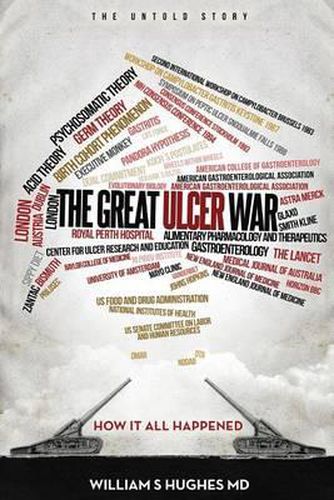Readings Newsletter
Become a Readings Member to make your shopping experience even easier.
Sign in or sign up for free!
You’re not far away from qualifying for FREE standard shipping within Australia
You’ve qualified for FREE standard shipping within Australia
The cart is loading…






In 1983, in Australia, a medical resident, Dr. Barry Marshall, and a hospital pathologist, Dr. Robin Warren, reported in two letters to The Lancet finding a bacterium associated with gastritis or inflammation of the stomach. The publication stimulated little reaction. However, a year later when they reported that the bacterium was also associated with ulcer disease and declared that bacteria caused ulcer disease, it had the effect of an assassination of an archduke. Most prominent clinical investigators in the United States and England argued that hyper secretion of acid was the cause of ulcer disease, and they collaborated with the pharmaceutical companies that made the new drugs that blocked acid secretion to attack the new bacterial theory. The Great Ulcer War tells how the war was fought, the weapons used, and the alliances made, and why the war in spite of overwhelming evidence in favor of the bacterial theory, lasted for ten years. The Great Ulcer War introduces a novel theory, the Pandora Hypothesis, to explain the length of the war. It proposes that the general medical establishment especially in the United States simply did not like the bacterial theories of major chronic diseases. These thought leaders- the big guys -facilitated and prolonged the opposition to the bacterial theory of ulcers largely by doing nothing to support the theory until the very end of the war. They were afraid that if a germ theory was accepted for ulcers, a Pandora’s Box of germ theories developed within university departments of microbiology for other chronic diseases would be opened and released into the medical world. This revelation would diminish the reputation and profit of the medical establishment and the pharmaceutical industry by threatening their favored explanations of the causes of these diseases: genomic errors and dysfunctional biochemistry and physiology.
$9.00 standard shipping within Australia
FREE standard shipping within Australia for orders over $100.00
Express & International shipping calculated at checkout
Stock availability can be subject to change without notice. We recommend calling the shop or contacting our online team to check availability of low stock items. Please see our Shopping Online page for more details.
In 1983, in Australia, a medical resident, Dr. Barry Marshall, and a hospital pathologist, Dr. Robin Warren, reported in two letters to The Lancet finding a bacterium associated with gastritis or inflammation of the stomach. The publication stimulated little reaction. However, a year later when they reported that the bacterium was also associated with ulcer disease and declared that bacteria caused ulcer disease, it had the effect of an assassination of an archduke. Most prominent clinical investigators in the United States and England argued that hyper secretion of acid was the cause of ulcer disease, and they collaborated with the pharmaceutical companies that made the new drugs that blocked acid secretion to attack the new bacterial theory. The Great Ulcer War tells how the war was fought, the weapons used, and the alliances made, and why the war in spite of overwhelming evidence in favor of the bacterial theory, lasted for ten years. The Great Ulcer War introduces a novel theory, the Pandora Hypothesis, to explain the length of the war. It proposes that the general medical establishment especially in the United States simply did not like the bacterial theories of major chronic diseases. These thought leaders- the big guys -facilitated and prolonged the opposition to the bacterial theory of ulcers largely by doing nothing to support the theory until the very end of the war. They were afraid that if a germ theory was accepted for ulcers, a Pandora’s Box of germ theories developed within university departments of microbiology for other chronic diseases would be opened and released into the medical world. This revelation would diminish the reputation and profit of the medical establishment and the pharmaceutical industry by threatening their favored explanations of the causes of these diseases: genomic errors and dysfunctional biochemistry and physiology.